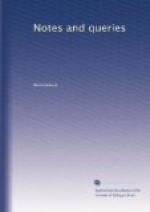S.S.S.
Richard Baxter’s Descendants (Vol. ii, p. 89.).—Your correspondent W.H.B., who wishes for information respecting the descendants of the celebrated Richard Baxter, describes him to have been a Northamptonshire man; now this (supposing the Nonconformist divine of that name is meant) is a mistake, for he was, according to his own account, a Shropshire man. In a narrative of the most memorable passages of his life and times, by himself, and published soon after his death under the title of Reliquiae Baxterianae, 1696, he says,
“My father’s name was Richard (the son of Richard) Baxter; his habitation and estate at a village called Eaton Constantine, a mile from the Wrekin Hill, and above half a mile from Severn River, and five miles from Shrewsbury in Shropshire. A village most pleasantly and healthfully situate. My mother’s name was Beatrice, the daughter of Richard Adeney of Rowton, a village near High Encall, the Lord Newport’s seat, in the same county. There I was born, A.D. 1615, on the 12th of November, being the Lord’s Day, in the morning, at the time of divine worship, and baptized at High Encall the 19th day following: and there I lived from my parents with my grandfather till I was near ten years of age, and then was taken home.”
He was married on Sept. 10, 1662, to a Miss Charlton. They had no children. The only descendant of Richard Baxter known to his biographers, was his nephew, William Baxter, a person of considerable attainments as a scholar and an antiquary. He was born in Shropshire in 1650. He published several works, and kept an academy for some years at Tottenham Cross, Middlesex, which he gave up on being chosen master of Mercer’s School, London, where he continued for twenty years, and resigned a short time before his death, which took place in 1723.
Baxter makes mention, at the close of his own Life and Times, of one Richard Baxter, a Sabbatarian Anabaptist, and says of him, “that he was sent to gaol for refusing the oath of allegiance, and it went for current that it was I.”
H.M. Bealby.
North Brixton.
Duresme and Dunelm (Vol. ii., p. 108.).—Three successive bishops, Morton, Cosin, and Crewe, took the signature of Duresme after their Christian names. Three successive bishops, Barrington, {207} Van-Mildert, and the present occupant of the see, have taken the signature of Dunelm. I think, therefore, J.G.N. is mistaken in saying that the Bishops of Durham have assumed the French and Latin signatures alternately.
E.H.A.
* * * * *
MISCELLANEOUS.
NOTES ON BOOKS, SALES, CATALOGUES, ETC.




